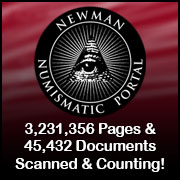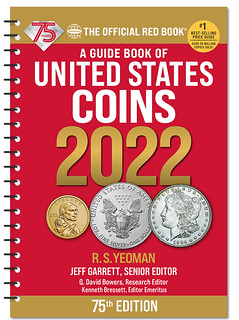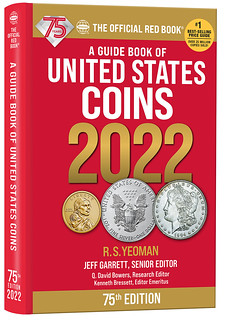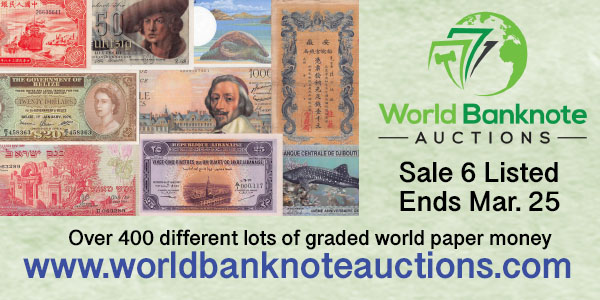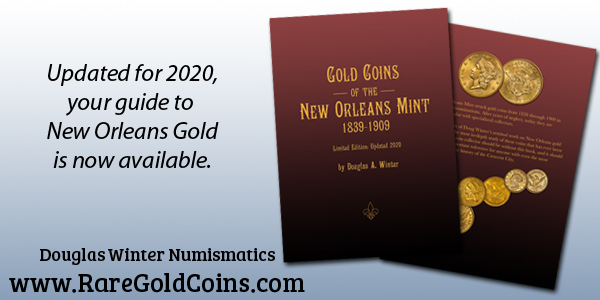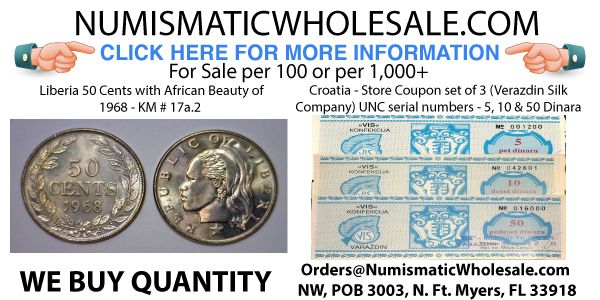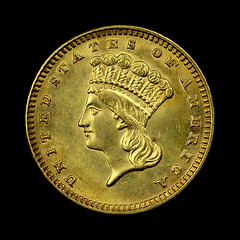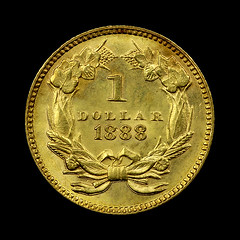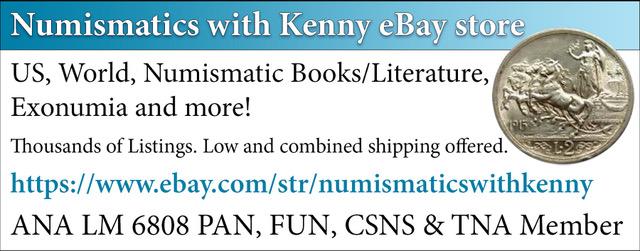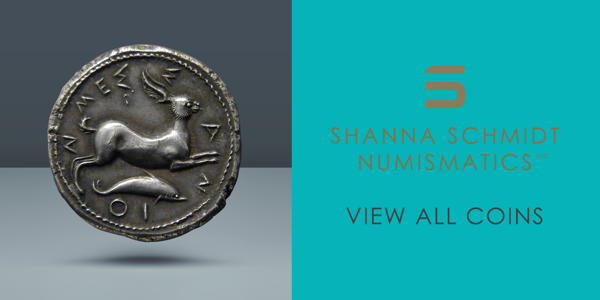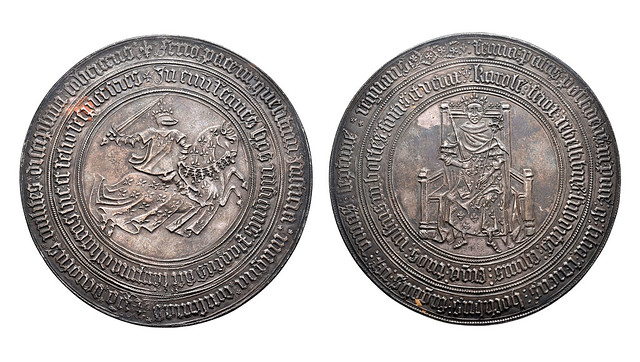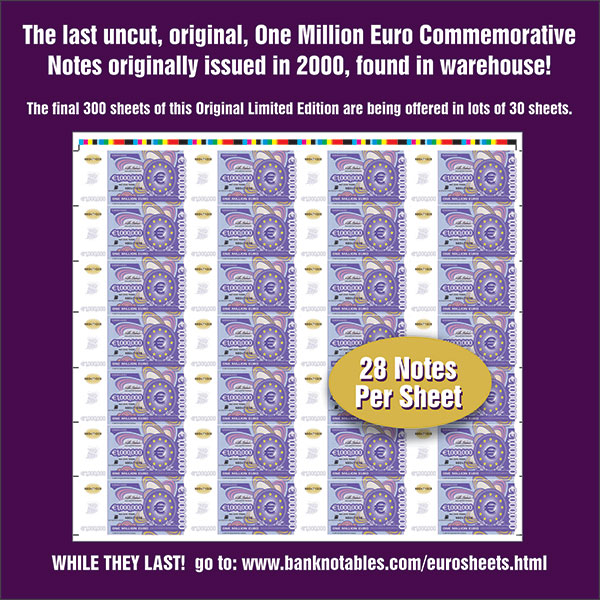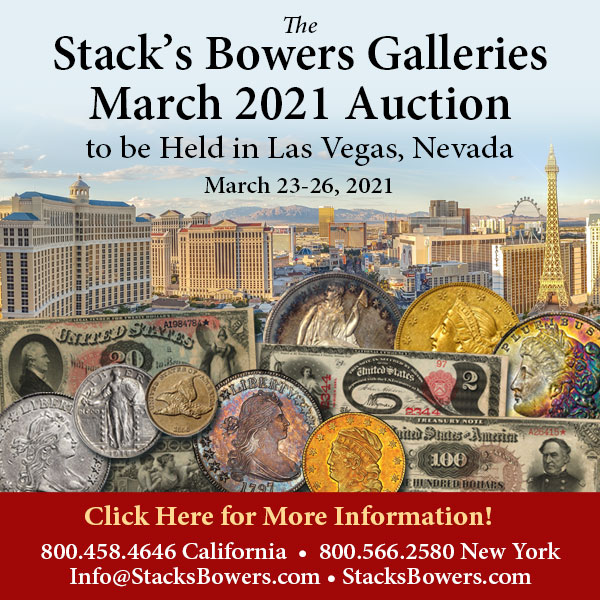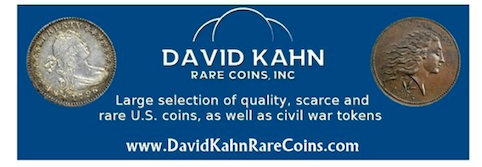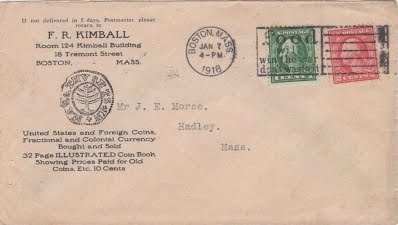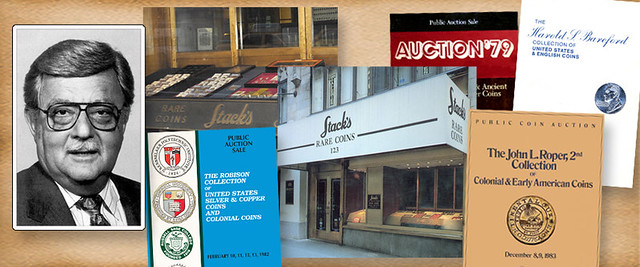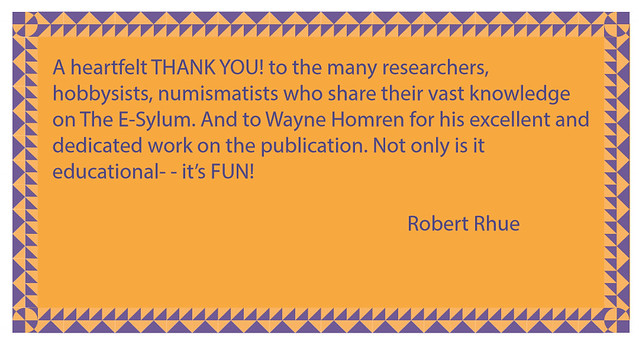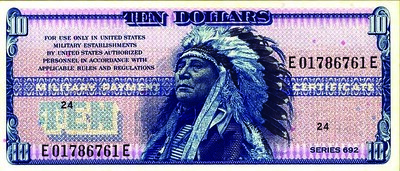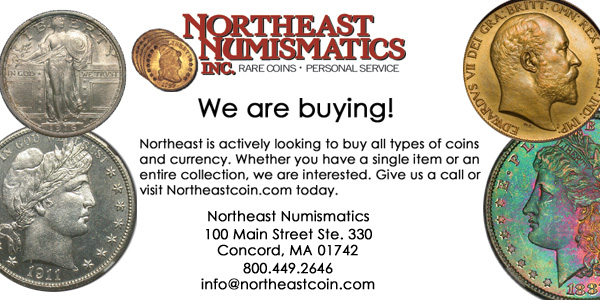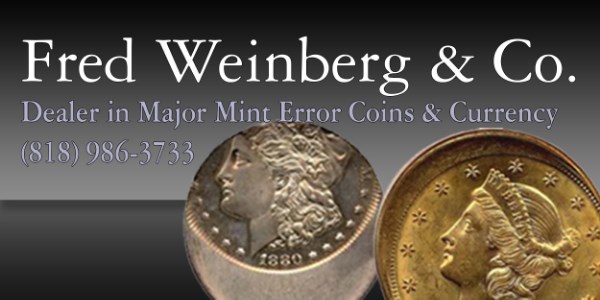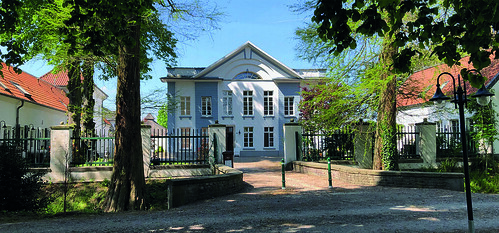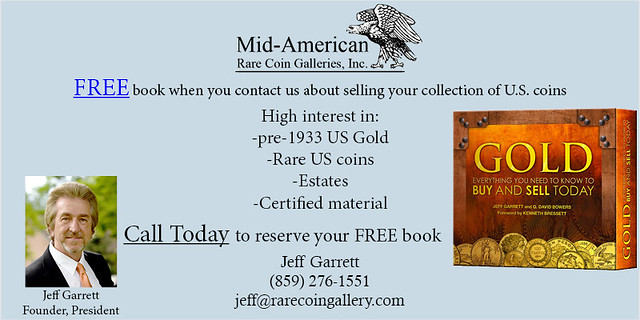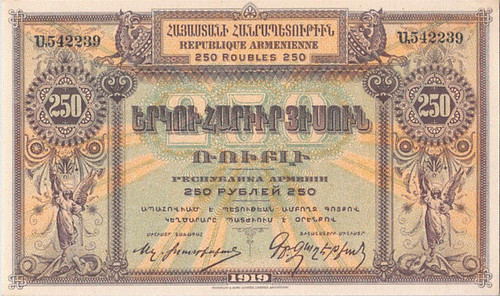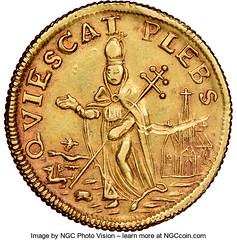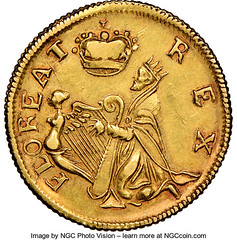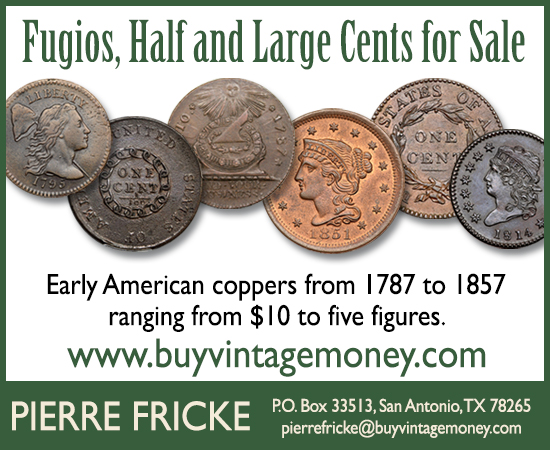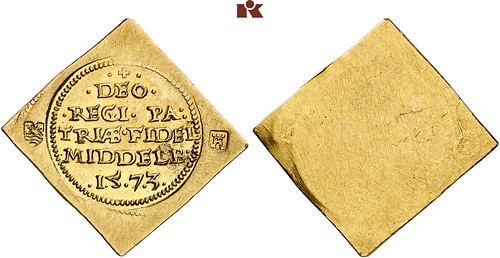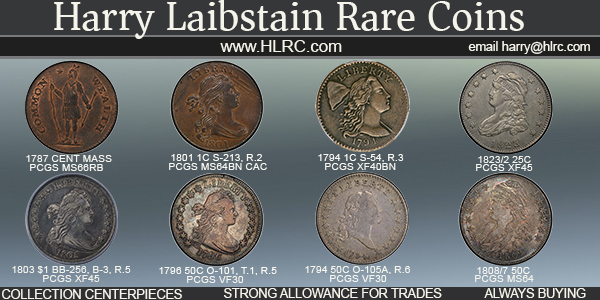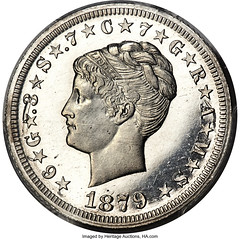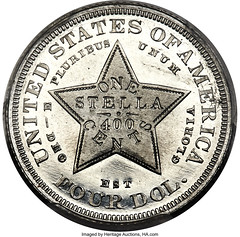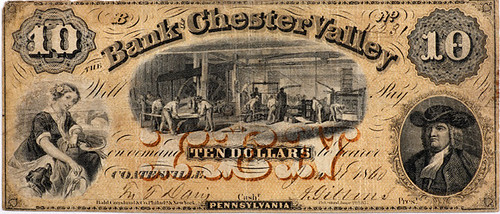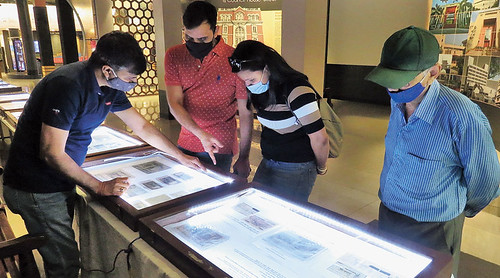
Visit our NBS Sponsors


About UsThe Numismatic Bibliomania Society is a non-profit association devoted to the study and enjoyment of numismatic literature. For more information please see our web site at coinbooks.org SubscriptionsThose wishing to become new E-Sylum subscribers (or wishing to Unsubscribe) can go to the following web page link MembershipThere is a membership application available on the web site Membership Application To join, print the application and return it with your check to the address printed on the application. Print/Digital membership is $40 to addresses in the U.S., and $60 elsewhere. A digital-only membership is available for $25. For those without web access, write to: Charles Heck, Treasurer AsylumFor Asylum mailing address changes and other membership questions, contact Chuck at this email address: treasurer@coinbooks.org SubmissionsTo submit items for publication in The E-Sylum, write to the Editor at this address: whomren@gmail.com BUY THE BOOK BEFORE THE COINSale Calendar |
- WAYNE'S WORDS: THE E-SYLUM MARCH 14, 2021
- NEW BOOK: GUIDE BOOK OF U.S. COINS, 75TH ED.
- NEW BOOK: AUSTRALIAN PRE-DECIMAL VARIETIES
- NEW BOOK: PAPER MONEY OF ESTATES OF SUMATRA
- NEW BOOK: PRISONER-OF-WAR CAMP MONEY
- BOOK REVIEW: CONFIDENT CARSON CITY COLLECTOR
- DAVID JACOBSON WINS 2021 SHEKEL PRIZE
- COINAGE OF 1888 DESIGNED TO AVOID SPECULATION
- SYMPOSIUM: SS CENTRAL AMERICA DISCOVERIES
- VIDEO: MARCH 2021 COLLECTORAMA SHOW
- CHALLENGER WHISTLEBLOWER COMMEMORATIVE?
- NOTES FROM E-SYLUM READERS: MARCH 14, 2021
- MORE FROM E-SYLUM READERS: MARCH 14, 2021
- HARVEY STACK ON THE HOLLAND SALE
- QUERY: COLUMBIA FARTHINGS
- BOOKHUNTING IN VIET NAM
- VOCABULARY TERM: CURATING
- FRANCIS RICHARD KIMBALL (1859-1922)
- HARVEY STACK'S NUMISMATIC FAMILY, PART 91
- MEDALLIC ARTIST HEIDI WASTWEET
- BEP ARTIST LEN BUCKLEY TO SPEAK AT MPCFEST
- FAROUK 1933 DOUBLE EAGLE RETURNS TO MARKET
- MUENZEN GUT-LYNT ONLINE AUCTIONS
- WORLD BANKNOTE AUCTIONS SALE 6 SELECTIONS
- HERITAGE MARCH 2021 PARTRICK SALE SELECTIONS
- NUMISMATIC NUGGETS: MARCH 14, 2021
- THE VIGGBYHOLM HOARD OF VIKING SILVER
- THE MARKSTETTEN COIN HOARD
- 1879 $4 COILED HAIR STELLA IN ALUMINUM
- REBECCA LUKENS’S IRON MILL
- INDIAN BANKNOTE EXHIBIT
- BITCOIN BANKNOTES
- LOOSE CHANGE: MARCH 14, 2021
Click here to read the thin version on the web
Click here to subscribe
Click here to access the complete archive
To comment or submit articles, reply to whomren@gmail.com
Content presented in The E-Sylum is not necessarily researched or independently fact-checked, and views expressed do not necessarily represent those of the Numismatic Bibliomania Society.
WAYNE'S WORDS: THE E-SYLUM MARCH 14, 2021
 New subscribers this week include:
Nisipeanu Ionut Silvian, and
Ernie West.
Welcome aboard! We now have 6,614 subscribers.
New subscribers this week include:
Nisipeanu Ionut Silvian, and
Ernie West.
Welcome aboard! We now have 6,614 subscribers.
Thank you for reading The E-Sylum. If you enjoy it, please send me the email addresses of friends you think may enjoy it as well and I'll send them a subscription. Contact me at whomren@gmail.com anytime regarding your subscription, or questions, comments or suggestions about our content.
This week we open with four new books, a book review, the Shekel prize winner, updates from the Newman Numismatic Portal, and more.
Other topics this week include the U.S. coinage of 1888, the S.S. Central America, notes from E-Sylum readers, the Pennypacker Holland sale, Columbia Farthings, Heidi Wastweet, the Farouk 1933 Double Eagle, auction selections, medieval coin hoards, the 1879 aluminum Stella, Rebecca Lukens's iron mill, and Indian banknotes.
To learn more about Carson City coinage, the last Herodian monarch Agrippa II, U.S. Mint Director James Kimball, Boston dealer F. R. Kimball, John L. Roper II, the Ridgway medal, the 1921-S Zerbe dollars, Poker and Numismatics, De La Rue Test Notes, Ricketts's Circus token, and Bitcoin banknotes, read on. Have a great week, everyone!
Wayne Homren
Editor, The E-Sylum
NEW BOOK: GUIDE BOOK OF U.S. COINS, 75TH ED.
Here's the press release for the landmark 75th edition of the classic A Guide Book of United States Coins, which will be available in four different formats. -Editor
The Diamond Anniversary 75th edition of the Guide Book of United States Coins (the hobby’s popular Red Book
) will debut in four distinct formats on April 6, 2021. Each version features the same content, with 32,000 retail prices in multiple grades, historical information, 2,000 high-resolution full-color photographs, and guidance on collecting every type of American coin.
The convenient spiralbound softcover format was designed to lie flat when open on a desk or table. It measures 7.7" by 6" and is bound with a durable metal coil. This is the most popular modern format of the Red Book,
said Whitman publisher Dennis Tucker. The first spiralbound-softcover Red Book debuted in 1997, with the 50th edition. It was next available in 1999, and we’ve offered the format every year since then. Collectors like it because you can set your coins out in front of you, and have your Red Book lying flat, open to whatever page you want to study.
NEW BOOK: AUSTRALIAN PRE-DECIMAL VARIETIES
There's a new edition of the Renniks book on Australian pre-decimal coin varieties by Ian McConnelly. Here's the (short) description from the publisher's website. -Editor
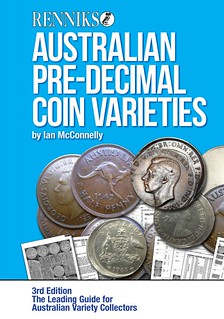 Renniks Australian Pre Decimal Coin Varieties 3rd Edition
Renniks Australian Pre Decimal Coin Varieties 3rd Edition
$34.95
ISBN: 9780987105707
The latest edition in ‘Australian Pre – Decimal Coin Varieties’ is now available! Compiled, written and researched by popular Coin and Banknote Magazine contributor, Ian McConnelly, this book is a must have
for all Australian Pre – Decimal variety collectors.
For more information, or to order, see:
Renniks Australian Pre Decimal Coin Varieties 3rd Edition
(https://renniks.com/shop/renniks-australian-pre-decimal-coin-varieties-3rd-edition-2/)
NEW BOOK: PAPER MONEY OF ESTATES OF SUMATRA
Ad Lansen has published a new book on the paper money of the estates of Sumatra. Congratulations! Here's the announcement. -Editor
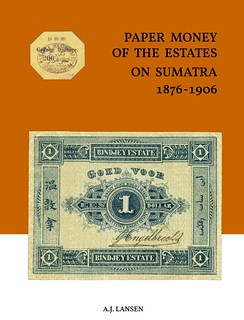 Now available, a new publication about the paper money used by the estates on Sumatra in the period 1876-1906. A brief description is given of each cultivation company, with an overview of all known issues (the main share of which is in the National Numismatic Collection, DNB), and a detailed description of each note. The publication is completely bilingual English-Dutch, with transcription of the headings in Chinese, Malay and Tamil, and richly illustrated in color. The author, Ad Lansen, is already known for his previous publications, including Plantation Tokens of the Dutch East Indies.
Now available, a new publication about the paper money used by the estates on Sumatra in the period 1876-1906. A brief description is given of each cultivation company, with an overview of all known issues (the main share of which is in the National Numismatic Collection, DNB), and a detailed description of each note. The publication is completely bilingual English-Dutch, with transcription of the headings in Chinese, Malay and Tamil, and richly illustrated in color. The author, Ad Lansen, is already known for his previous publications, including Plantation Tokens of the Dutch East Indies.
This new book has 126 pages in a4 format, with hard cover, is self-published and can be ordered from the author: Haanderik 94, 3401 et IJsselstein (nl), e-mail: a.j.lansen@hccnet.nl. Price: € 29.50 + postage.
NEW BOOK: PRISONER-OF-WAR CAMP MONEY
An article by Hans-Ludwig Grabowski on the Geldscheine Online site discusses a new book on prisoner-of-war camp money. Here's a Google translation. -Editor
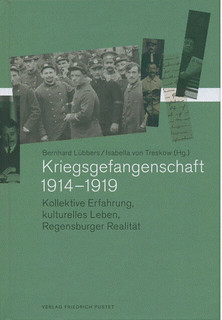 Bernhard Lübbers / Isabella von Treskow (eds.):
Bernhard Lübbers / Isabella von Treskow (eds.):
Captivity of War 1914–1919
Collective experience, cultural life, Regensburg reality
402 pages, black and white illustrations,
Format 15.5 cm x 23.2 cm, hardcover,
Regensburg 2019, published by Friedrich Pustet.
ISBN: 978-3-7917-3080-6.
Price: 39.95 euros.
After the prisoner of war newspaper "Le Pour et le Contre - Journal des Prisonniers de Regensburg", which was published in Regensburg during the First World War, was acquired for the holdings of the Regensburg State Library, this was the occasion for an extensive academic debate, not just up to then practically unexplored Regensburg camps, but on the subject of the German prisoner-of-war camps of the First World War in general.
As volume 2 in the series of cultural-historical research on captivity and internment in the First World War, the joint work presented here by various authors was published by Dr. phil. Lübbers and the holder of the chair for Romance Philology at the University of Regensburg, Dr. phil. von Treskow, was published.
BOOK REVIEW: CONFIDENT CARSON CITY COLLECTOR
Len Augsburger published a review in the March 2021 E-Gobrecht (the online publication of the Liberty Seated Collectors Club) about Rusty Goe's new three-volume work on Carson City coinage. With permission, we're republishing it here. Thanks! -Editor
Rusty Goe Publishes The Confident Carson City Collector
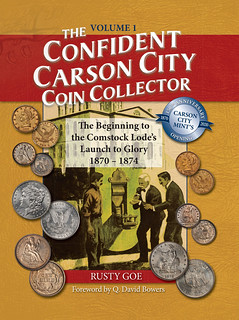 Following up on his previous books (The Mint on Carson Street, 2003, and James Crawford: Master of the Mint at Carson City, 2007), Rusty Goe is at it again, with a three-volume compendium on Carson City coinage, The Confident Carson City Collector. This is a massive work, weighing in at 2,500 pages, and we can be grateful it is split into multiple volumes. Let’s address the elephant in the room immediately – this is not a cheap set of books, and will run you around $300. But, if you intend to spend thousands of dollars on Carson City coinage (and you could easily spend a lot more), you will do well to allocate a few percent of your coin budget to education. Books play an important role, but do not form the whole picture – I highly recommend the ANA in-person grading course, and traveling to shows to compare coins face-to-face with other collectors can also be a learning experience.
Following up on his previous books (The Mint on Carson Street, 2003, and James Crawford: Master of the Mint at Carson City, 2007), Rusty Goe is at it again, with a three-volume compendium on Carson City coinage, The Confident Carson City Collector. This is a massive work, weighing in at 2,500 pages, and we can be grateful it is split into multiple volumes. Let’s address the elephant in the room immediately – this is not a cheap set of books, and will run you around $300. But, if you intend to spend thousands of dollars on Carson City coinage (and you could easily spend a lot more), you will do well to allocate a few percent of your coin budget to education. Books play an important role, but do not form the whole picture – I highly recommend the ANA in-person grading course, and traveling to shows to compare coins face-to-face with other collectors can also be a learning experience.
DAVID JACOBSON WINS 2021 SHEKEL PRIZE
Mel Wacks submitted this announcement of the winner of the AINA's 2021 Shekel Prize. -Editor
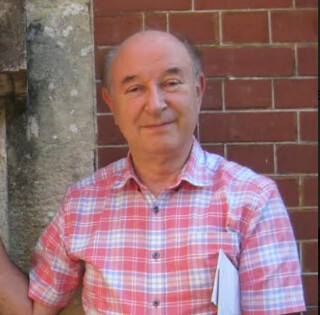 David Jacobson, Associate of the Faculty of Oriental Studies Faculty, University of Oxford, has
won the Shekel Prize Medal, awarded by the American Israel Numismatic Association for
David Jacobson, Associate of the Faculty of Oriental Studies Faculty, University of Oxford, has
won the Shekel Prize Medal, awarded by the American Israel Numismatic Association for
Agrippa II, the Last of the Herods
as the best 2020 publication on Judaic/Israel numismatics.
Upon receiving the news, Jacobson indicated: It is a great honour to be the recipient of this
prestigious award and I greatly appreciate the esteem of the members of the judging committee
of my endeavours.
Jacobson has described his attraction to the subject: What drew me to studying the coinage of
the last Herodian monarch Agrippa II, the last Herodian king in the Land of Israel were its
distinctive characteristics. His coin issues are prolific, almost equalling the combined total of all
the previous Herodian kings and tetrarchs. Its other striking feature was the closeness of its
various coin designs to those of Roman coins.
I quickly realised that the coinage of Agrippa II had hitherto not received adequate treatment and
so decided to investigate it myself. In my first study of this coinage, I was able to show that the
coin denominations reflect a move to integrate Agrippa II’s currency system with the Roman one
(Israel Numismatic Journal 19 (2016), 63-75). Delving deeper, I found that I could use the era
used on his coins to pinpoint the year of his death to 94/95 CE. Hitherto, the end of Agrippa’s
reign had remained an unsettled question, in contention among scholars.
COINAGE OF 1888 DESIGNED TO AVOID SPECULATION
The latest addition to the Newman Numismatic Portal is U.S. Mint correspondence relating to the 1888 coinage. Project Coordinator Len Augsburger provided the following report. Thanks. -Editor
Coinage of 1888 Designed to Avoid Speculation
Recently added to Newman Portal is correspondence from the National Archives that reveals the rationale behind certain of the 1888 U.S. coinage. James Kimball, Mint Director, writes to Philadelphia Mint Superintendent Daniel M. Fox, ordering the additional coinage of 10,000 one-dollar gold pieces, 5,000 three-dollar gold pieces, and 10,000 three-cent nickels. Fox was instructed to put the coins directly into general circulation, so as to avoid speculation. Collectors by this time were already seeking out the scarce 1880s denominational silver coinage, as most of the Mint’s attention was diverted toward producing massive quantities of Morgan dollars under the directive of the 1878 Bland-Allison act. The 1888 coinage production, as directed by Kimball, succeeded in avoiding rarities, although the three issues mentioned here remain highly desirable to collectors today.
Image: 1888 $1 gold piece from the Newman collection, NGC MS63 CAC, ex Col. Green, Newman V (Heritage Auctions, November 2014, lot 7367, realized $1057.50).
Link to Mint Director Kimball correspondence on April 11, 1888 on Newman Portal:
https://archive.org/details/coinsmallgoldtoavoidspeculation18880411/mode/2up
Link to National Archives content on Newman Portal:
https://nnp.wustl.edu/Library/Archives?searchLetter=U
SYMPOSIUM: SS CENTRAL AMERICA DISCOVERIES
One of the headline presentations at the upcoming NNP Symposium is Bob Evans' talk on some of the unusual aspects of the SS Central America treasure. Here's the press release. -Editor
Ship of GoldBell Toll During Presentation By Bob Evans, March 21
Scientist Evans will show items from the legendary SS Central America during free online Newman Numismatic Portal Symposium
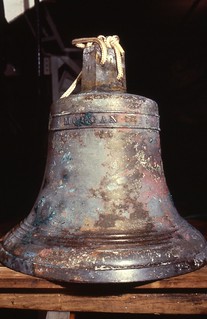 A sound only a few have heard since 1857 will be used to signal the start of a free online presentation as part of a Newman Numismatic Portal Symposium (
www.NNPsymposium.org) at 1 pm Eastern on Sunday, March 21, 2021. It is the ringing of the ship’s bell recovered from the fabled
A sound only a few have heard since 1857 will be used to signal the start of a free online presentation as part of a Newman Numismatic Portal Symposium (
www.NNPsymposium.org) at 1 pm Eastern on Sunday, March 21, 2021. It is the ringing of the ship’s bell recovered from the fabled Ship of Gold,
the SS Central America, that sank in 1857 while carrying crew, passengers, and tons of California Gold Rush-era treasures.
Scientist and historian Bob Evans, who was a key member on each of the recovery expeditions starting in the late 1980s, will present an illustrated talk entitled, SS Central America, Ship of Gold: Unusual Discoveries, Wonders, and Mysteries.
He will open his symposium session with a recording of the 268-pound bronze bell that was recovered from the Atlantic Ocean floor and has been in secure storage for more than three decades.
THE BOOK BAZARRE
VIDEO: MARCH 2021 COLLECTORAMA SHOW
These are selections from the David Lisot Video Library that feature news and personalities from the world of coin collecting. David has been attending coin conventions since 1972 and began videotaping in 1985. The Newman Numismatic Portal now lists all David’s videos on their website at:
https://nnp.wustl.edu/library/multimediadetail/522852
Here's one on the recent Collectorama show in Lakeland, Florida. -Editor
Collectorama Show Features Coins, Currency & Collectibles During COVID Crisis 2021.
VIDEO: 5:04.
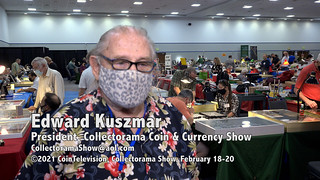 Edward Kuszmar, President, Collectorama Coin & Currency Show,
Edward Kuszmar, President, Collectorama Coin & Currency Show,
David Lisot, Interviewer, CoinTelevision.com.
February 18, 2021.
During the last year many larger coin conventions have been cancelled due to the COVID Pandemic. Edward Kuszmar was able to satisfy government bureaucracies and collector concerns by holding the 70th Collectorama Coin & Currency Show in Lakeland, Florida while the Corona Virus was still a threat. Ed explains what precautions were taken and why this convention is different from a normal coin show.
An excerpt of the video is available for viewing on the Coin Television YouTube Channel at:
https://youtu.be/DyIN3egsjSg
CHALLENGER WHISTLEBLOWER COMMEMORATIVE?
Vic Mason of Mamaroneck, NY submitted this suggestion for the U.S. Mint. Thanks. -Editor
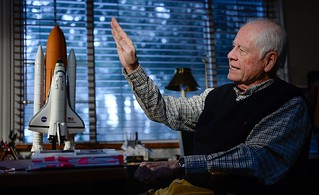 This note is motivated by the obituary column in Wednesday’s New York Times reporting the passing, at 83, of Allan J. McDonald, one of the engineers at Morton Thiokol who tried to stop the 28 January 1986 launch of the Challenger space shuttle, which broke apart 73 seconds after liftoff, killing teacher Christa McAuliffe and six other astronauts. The story is timely now that the United States Mint is preparing, 35 years later, to issue the 2021 Christa McAuliffe Commemorative Silver Dollar in her honor as the first participant in the United States National Aeronautics and Space Administration (NASA)
Teacher in Space program.
This note is motivated by the obituary column in Wednesday’s New York Times reporting the passing, at 83, of Allan J. McDonald, one of the engineers at Morton Thiokol who tried to stop the 28 January 1986 launch of the Challenger space shuttle, which broke apart 73 seconds after liftoff, killing teacher Christa McAuliffe and six other astronauts. The story is timely now that the United States Mint is preparing, 35 years later, to issue the 2021 Christa McAuliffe Commemorative Silver Dollar in her honor as the first participant in the United States National Aeronautics and Space Administration (NASA)
Teacher in Space program.
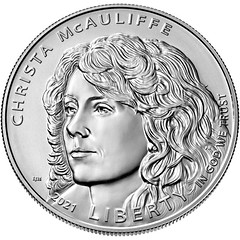 The Challenger launch, from the Kennedy Space Center in Florida, was coincidentally scheduled for the same day that President Ronald Reagan was to deliver his State of the Union address. Mr. Reagan had planned to mark the fact that Ms. McAuliffe would be the first American civilian astronaut in space, and NASA was keen to keep to the launch schedule. But the night before, the Morton Thiokol team would not agree to approve the launch because, based on previous experience, they feared that the severe cold that night – 18 degrees Fahrenheit – would cause the rubber O-ring gaskets on the booster rockets to stiffen, thereby likely causing a fuel leak and the potential explosion and destruction of the rocket.
The Challenger launch, from the Kennedy Space Center in Florida, was coincidentally scheduled for the same day that President Ronald Reagan was to deliver his State of the Union address. Mr. Reagan had planned to mark the fact that Ms. McAuliffe would be the first American civilian astronaut in space, and NASA was keen to keep to the launch schedule. But the night before, the Morton Thiokol team would not agree to approve the launch because, based on previous experience, they feared that the severe cold that night – 18 degrees Fahrenheit – would cause the rubber O-ring gaskets on the booster rockets to stiffen, thereby likely causing a fuel leak and the potential explosion and destruction of the rocket.
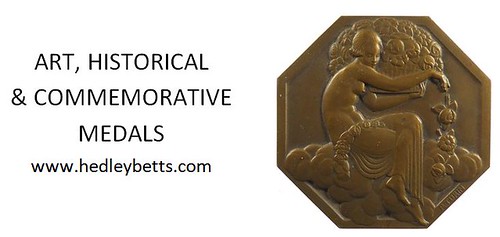
NOTES FROM E-SYLUM READERS: MARCH 14, 2021
More on the 1455 Calaisienne Medal of Charles VIILast week we discussed a great medal offered in the upcoming Lugdunum GmbH Spring sale. An email from Dr. Jonas Flueck got caught in my spam folder; sorry - here's a great photo and additional information on the medal. See the earlier article for a link to the video. -Editor
FRANCE, KINGDOM. Charles VII, 1422-1461. Large silver medal 1455 (Chronogram), unsigned, commemorating the expulsion of the English and the end of the Hundred Years’ war. 69 mm; 60.95 gr. Obverse: The King on horseback, armed from head to foot and with closed visor. Both he and his horse bear the blazon of France he has a drawn sword in his hand. Reverse: The King in majesty holding the sceptre and the sword. References: Trésors de Numismatique et de Glyptique pl. II, 2; Mazerolle, T. 3, 5; Vallet de Viriville 5; Collection Fillon 138 (this specimen); Collection Engel-Gros 100 (this specimen).
To read the earlier E-Sylum article, see:
THE 1455 CALAISIENNE MEDAL OF CHARLES VII
(https://www.coinbooks.org/v24/esylum_v24n10a19.html)
Other topics this week include the Romano Worthy hoard, Liberty Head Nickel hub varieties, Whitman Encyclopedia of Obsolete Paper Money plans, and more. -Editor
Back in 2000 the Naples Bank Note Company (NBNC) intended to offer the European Central Bank the opportunity to have a US company print the Euro. In order to get samples to submit to the ECB, Naples Bank Note designed this One Million Euro Commemorative, complete with over 20 security features, including some never used before and only original to NBNC. These are the last sheets remaining. For collectors only.
MORE FROM E-SYLUM READERS: MARCH 14, 2021
John Mercanti Product Images SoughtDennis Tucker of Whitman Publishing writes:
"For the upcoming fourth edition of John Mercanti’s American Silver Eagles, I’m looking for high-resolution images (obverse and reverse) of the following medals and other U.S. Mint productions that John designed and/or engraved. I’ve queried the Mint, but I’d also like to see if any E-Sylum readers have good, clear images to share.
- 1982 Netherlands/America Enduring Friendship medal
- 1983 Fred Waring Congressional Gold Medal
- 1984 Leo J. Ryan Congressional Gold Medal
- 1984 U.S. Mint Set filler token
- 1985 President Harry Truman Congressional Gold Medal
- 1989 Mary Lasker Congressional Gold Medal
- 1992 Persian Gulf Conflict Veterans Medal
- 1992 General Norman Schwarzkopf Congressional Gold Medal
- 1993 U.S. Mint Director David J. Ryder medal
- 1995 Rabbi Menachem Schneerson Congressional Gold Medal
- 1995 U.S. Mint Director Philip Diehl medal
- 1997 Frank Sinatra Congressional Gold Medal
- 1998 U.S. Mint Service Award pin
- 2000 John Cardinal O’Connor Congressional Gold Medal
- 2002 General Henry H. Shelton Congressional Gold Medal"
Can anyone help? -Editor
Other topics this week include Martin Gengerke, Dr. Helen Wang, Dennis the Menace, and the first paper money authorized in North America. -Editor
HARVEY STACK ON THE HOLLAND SALE
Last week we discussed the 1955 Pennypacker sale of the Ira Reed estate. An earlier article (linked in last week's issue) discussed the May 1959 Pennypacker sale of the Leonard M. Holland Large Cent collection. Harvey Stack was there and submitted this remembrance of the event. Thanks! First, here's the Kolbe & Fanning description of the sale from that earlier article. -Editor
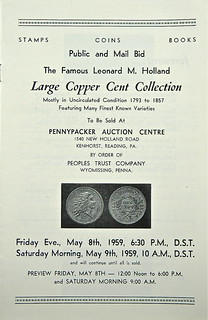 The Pennypacker sale was a remarkable event, offering a fine collection of large cents assembled in the late 1940s and 1950s, mostly acquired from Leonard Holland's good friend Thomas Elder. Holland pledged the collection as collateral for a construction project loan in the late 1950s. He encountered unforeseen difficulties and the bank foreclosed the loan, choosing an obscure country auctioneer to liquidate the collection. Distribution of the catalogue was limited and the coins generally sold for low prices. Some of the important collectors of the day did not learn of the sale and several of the attendees funneled their bids through a single agent.
The Pennypacker sale was a remarkable event, offering a fine collection of large cents assembled in the late 1940s and 1950s, mostly acquired from Leonard Holland's good friend Thomas Elder. Holland pledged the collection as collateral for a construction project loan in the late 1950s. He encountered unforeseen difficulties and the bank foreclosed the loan, choosing an obscure country auctioneer to liquidate the collection. Distribution of the catalogue was limited and the coins generally sold for low prices. Some of the important collectors of the day did not learn of the sale and several of the attendees funneled their bids through a single agent.
After the sale, it is reported that the coins were again auctioned within the group in a hotel room. Sometimes, the differences were dramatic, with coins subsequently bringing double or triple the original hammer price. Notables attending the sale included Ray Gallo, Louis Helfenstein, Dorothy Paschal, Gene Reale, C. Douglas Smith, Harvey Stack, Willard C. Blaisdell, Michael Kolman, Allen McDowell and Walter Breen.
Here are Harvey's recollections. -Editor
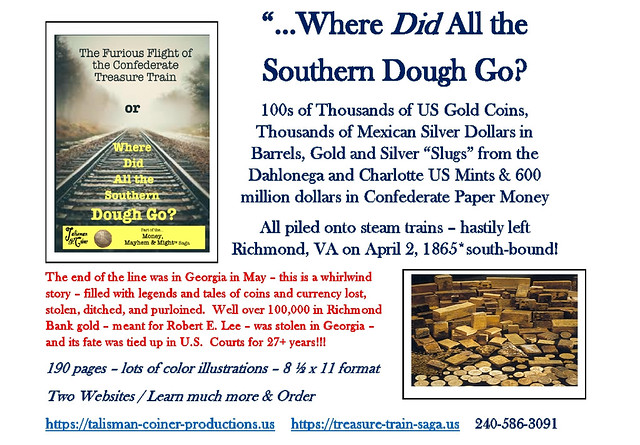
QUERY: COLUMBIA FARTHINGS
Dave Hirt writes:
"In the August 1937 Numismatist, page 717, John F Jones has a short article, with a picture titled Columbia Farthings. I had never heard of these items! Jones quotes Lyman Low, (who knew a bit about tokens), as saying, "From whence they came and whither going, no man knoweth"). They seem to have been struck in the early 1820's, and seem to be of British workmanship. Perhaps they circulated during the "Hard times period"..
"Low sold examples in his Cutting sale in 1898, as did David Proskey in his R. C. Davis sale in 1890. I am sure that some of our amazing readers know about these items also!"
Great question. I was unfamiliar with these as well. Here's an excerpt with a portion of the article image. -Editor
BOOKHUNTING IN VIET NAM
Howard Daniel submitted this story about bookhunting in Viet Nam. Thanks! Great story. -Editor
 The first image in your item Finding Rare Numismatic Literature Online looks like an alleyway bookshop and it brought back some old memories to me.
The first image in your item Finding Rare Numismatic Literature Online looks like an alleyway bookshop and it brought back some old memories to me.
When I first went back to Viet Nam after the war in 1989, I found a used bookstore on the
main street in Ho Chi Minh City (Saigon). It contained thousands of books which were confiscated by the government from abandoned houses of people who got out of the city before April 30, 1975. I walked around inside and could not find anything so I stopped to talk to an old man working behind a counter. His name was Mr Le Thach and he spoke English. After I told him I was looking for old dictionaries, economic and banking histories, and books about coins and paper money, he asked me if I wanted books about Viet Nam! I told him if he had other than Viet Nam, I would be interested in seeing them, but I really wanted ones about Viet Nam. He was very pleasantly surprised.
VOCABULARY TERM: CURATING
Here's another entry from Dick Johnson's Encyclopedia of Coin and Medal Terminology. -Editor
Curating. The many curatorial duties to identify, catalog, preserve and protect specimens for study. Curators may be called upon for a variety of activities from appraising to exhibiting to writing about the objects under their care. But a curator may be said to be an administrator of objects. Of greatest importance is conservation and preservation – protecting and keeping these objects from damage, deterioration and disappearance. Fortunately numismatic objects are easy to preserve, since most are metal, but their small size can be a problem. Paper money and nonmetal objects have their own problems of preservation.
FRANCIS RICHARD KIMBALL (1859-1922)
Here's another entry from the online draft of John Lupia's book of numismatic biographies. Thanks! This is an excerpt with the full article and bibliography available online. This week's subject is Boston dealer F. R. Kimball. -Editor
Francis Richard Kimball (1859-1922), was born on March 11, 1859, at Hopkinton, New Hampshire, son of Harvey Kimball (1822-1878), and Grace Judith Kimball.
He married Maria Putney Connor (1862-1910) and they had a daughter Grace Judith Kimball.
He was a member of the ANA and BNS.
He was a dealer in stamps and coins. He published Kimball's Illustrated Coin Guide.
HARVEY STACK'S NUMISMATIC FAMILY, PART 91
The latest article in Harvey Stack's blog series discusses the legendary 1983 Roper Collection sale of colonial and early American coins. Thanks! -Editor
December 1983 brought our sale of the spectacular John L. Roper Collection of Early American and Colonial Coins. We were honored to have been chosen to present this auction, comprising 684 lots of many of the choicest and rarest coins in this specialty, one of the most important collections ever formed and then sold at auction.
John L. Roper II, was a native of Norfolk , Virginia who traced his ancestors to the earliest settlers in this colony. Mr. Roper (whose friends called him Jack), was for decades CEO and president of the Norfolk Shipbuilding and Dry Dock Co. Active before, during and after World War II , their dry docks were used by many of the commercial and military ships of companies worldwide. In the early 1970s, under the direction of Jack and his sons, the company built a new dry dock facility to accommodate the largest ships that sailed the seven seas. Jack was dedicated to the City of Norfolk, was an active officer in several banks and work diligently with many charities. He loved the history of the Virginia settlement and the development of Norfolk. He decided to collect the money used in the colonies as a result of this great interest in the early days of his state and city. He loved to discuss the history of each colony and the evolution of the money that was used as our country grew from the earliest European settlers through the establishment of the United States of America. The Roper Collection contained a major assemblage of all the colonial coins struck, obtained from dealers like Stack's, and from auctions of his time, with many featuring some great pedigrees.
MEDALLIC ARTIST HEIDI WASTWEET
Louis Golino published a great article about medallic artist Heidi Wastweet on the Mint News Blog site. Here's an excerpt - be sure to read the complete article online. -Editor
 Heidi Wastweet is a name that is familiar to many collectors of modern coins and medals, especially those for whom the artistic aspect of coins is especially important.
Heidi Wastweet is a name that is familiar to many collectors of modern coins and medals, especially those for whom the artistic aspect of coins is especially important.
Heidi is a California-based sculptor who specializes in bas-relief sculpture that includes coins and medals as well as public art monuments. Bas-relief involves carving a design into a surface so that figures and motifs project slightly from the background.
Like many celebrated coin designers of the past such as American legends like Augustus Saint-Gaudens and Adolph Weinman, her true métier is sculpture, which is reflected in her medallic work that often features designs rendered with deep relief.
BEP ARTIST LEN BUCKLEY TO SPEAK AT MPCFEST
Here the press release for the upcoming MPCFest for collectors of Military Payment Certificates and other areas of military numismatics. -Editor
Leonard Buckley, designer of military payment certificates (MPC) and fine artist will make the key note presentation at MPCFest XX/ZFest II on April 10 via Zoom.
Buckley is best known among MPC collectors as the designer of MPC Series 692 which is also widely recognized as the most beautiful series of MPC. Because of the extraordinary designs Series 692 is also of interest to many collectors who are not MPC specialists.
Len’s artistic career as a designer was focused on literally making money. Out of high school, he began a seven year apprenticeship in New York, training in the art of steel die and intaglio plate making used to print world-wide currencies, postage stamps and financial securities.
With a total of ten years experience, he moved on in 1967 to Washington DC. There he worked at the U.S. Treasury’s Bureau of Engraving and Printing as a bank note designer. After six years, he went on to become the supervisor of the bank note design staff. In his 32 years with the Bureau of Engraving and Printing, he was responsible for the designs of many postage stamps, currency, military payment certificates and security documents for the federal government.
FAROUK 1933 DOUBLE EAGLE RETURNS TO MARKET
Sotheby’s will auction the Farouk 1933 Double Eagle in June. Since 2002 it has been owned by Stuart Weitzman of New York. Here's an excerpt from the sale announcement. -Editor
Sotheby’s New York is pleased to present Three Treasures – Collected by Stuart Weitzman, a dedicated live auction of three legendary treasures from the personal collection of the renowned fashion designer and collector. On 8 June 2021 Sotheby’s will offer the fabled and elusive 1933 Double Eagle Coin, which set a world record when it last sold at auction in 2002, and the only example that is legally sanctioned by the United States government for private ownership; the sole-surviving example of the British Guiana One-Cent Magenta, the most famous and valuable stamp in the world; and The Inverted Jenny Plate Block, the most well-known and sought-after American stamp rarity. Iconic as they are rare, the Double Eagle and the British Guiana will be offered with estimates of $10/15 million each and are poised to set new world auction records in their respective categories, and the Inverted Jenny will carry an estimate of $5/7 million, set to eclipse its own record for an American philatelic item.
MUENZEN GUT-LYNT ONLINE AUCTIONS
This press release announces a new online auction house. -Editor
Muenzen Gut-Lynt: A New Platform For Online Auctions and Numismatics
Muenzen Gut-Lynt is a new online auction house for numismatics. The brand was established by renowned dealers and auction houses from Switzerland and Germany. On 28 March 2021, they will be holding their first auction with over 950 pieces.
The new online auction house is based just outside Düsseldorf in the manor house of an old Lower Rhine estate, the eponymous Gut Lynt.
WORLD BANKNOTE AUCTIONS SALE 6 SELECTIONS
Here are some lots that caught my eye in the World Banknote Auctions Sale 6, which closes on March 25, 2021. -Editor
Armenia 1919 (ND 1920) P-32 PMG Gem UNC 65 EPQ 250 Rubles
Popular type from Armenia. While uncirculated examples come around from time to time, most are fairly ugly. This one is above average.
HERITAGE MARCH 2021 PARTRICK SALE SELECTIONS
Here are some items that caught my eye in the upcoming Heritage sale of the Donald G. Partrick collection of U.S. colonial coins. -Editor
(C. 1663-1672) Small Size St. Patrick, Gold--Scratched--NGC Details. AU. W-11530, Martin 1a.2-Ba.14, Unique. 184.9 grains. This example with a provenance dating to the late 1700s is the only genuine gold St. Patrick coin known today. It is the piece that appeared in the June 1909 Sotheby, Wilkinson & Hodge sale of the Rashleigh Collection that passed from Philip Rashleigh of Menabilly in the late 18th century to his great nephew, Jonathan Rashleigh, and to his son, Evelyn William Rashleigh. Plated in the 1909 Rashleigh catalog with the scrape across the cathedral visible in that appearance.
A second gold example was offered in the Norweb sale in 1988. That plain-edge piece was from the same dies as silver examples that Eric P. Newman identified as counterfeit in his article, "A Snake Breeds a St. Patrick Farthing," that appeared in The Numismatist of May 1962. The Norweb gold counterfeit failed to sell.
Interesting piece with a great provenance. -Editor
To read the complete lot description, see:
(C. 1663-1672) Small Size St. Patrick, Gold--Scratched--NGC Details. AU. W-11530, Martin 1a.2-Ba.14, Unique. ..
(https://coins.ha.com/itm/colonials/-c-1663-1672-small-size-st-patrick-gold-scratched-ngc-details-au-w-11530-martin-1a2-ba14-unique/a/1330-15006.s)
NUMISMATIC NUGGETS: MARCH 14, 2021
Here's a selection of interesting or unusual items I came across in the marketplace this week. Tell us what you think of some of these. -Editor
From spring 1572 to 1574 the Geusen kept a blockade ring around Middelburg. After several attempts to relieve the city, which was loyal to King Philip of Spain, failed, the city surrendered to the Prince of Nassau-Orange on February 19, 1574. During the blockade, two consecutive series of emergency coins were issued, and the city had a third series minted soon after it was taken. On December 20, 1572, the magistrate decided to mint emergency coins from the silver implements made available by the guilds and the council. On January 20, 1574, the city decided to convert the existing golden equipment into emergency money. The last series of those golden and silver cliffs that emerged after the surrender,
Siege coins in gold are quite rare. Here's a 1573 Gold Klippe from the siege of Middelburg. From the Kunker Spring 2021 sale. Google-translated text. -Editor
To read the complete lot description, see:
Stadt. Einseitige Klippe zu 1 Krone 1573 (Januaremission), Brause-M
(https://www.kuenker.de/en/auktionen/stueck/288837)
Other topics this week include the 1773 Carib War medal, and a 1829 Bust Half. -Editor
THE VIGGBYHOLM HOARD OF VIKING SILVER
Rick Lank passed along this item from The Conversation UK. Thanks. The author is unnamed. It discusses the numismatic interpretation of the Viggbyholm hoard of Viking silver found in 2020. -Editor
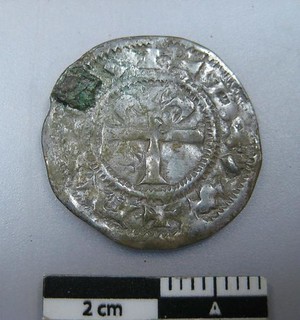 As a professor in numismatics, the study of currency, I have spent my life becoming an expert in coins, so was called to help them learn more about this exciting discovery. It turned out to be a very interesting find. Most of the coins were the types that we usually see in Sweden: English, Bavarian, Bohemian (Czech) and Islamic coins as well as imitations of Islamic coins. But one of the coins was unusual.
As a professor in numismatics, the study of currency, I have spent my life becoming an expert in coins, so was called to help them learn more about this exciting discovery. It turned out to be a very interesting find. Most of the coins were the types that we usually see in Sweden: English, Bavarian, Bohemian (Czech) and Islamic coins as well as imitations of Islamic coins. But one of the coins was unusual.
Found within this hoard was a Norman coin from the late tenth century. It is only the second Norman coin found in Sweden, and they have rarely been found in the rest of Scandinavia. This is surprising because the duchy of Normandy was created when King Charles the Simple of West Francia (roughly modern-day France) gave a bit of land to the Viking chief Rolf (or Rollo) in 911.
THE BOOK BAZARRE
THE MARKSTETTEN COIN HOARD
Künker published an article about the Markstetten Coin Hoard discovered in 2017. Here's an excerpt. The firm is offering coins from the hoard in their auction 349. -Editor
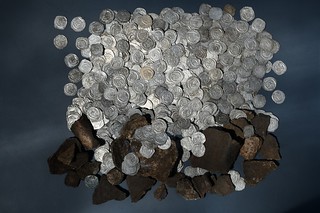 On 18 June 2017, a coin hoard was discovered near Markstetten: at one point after 1228, an unknown person buried a clay vessel, which contained exactly 560 pfennigs. Except for one piece, all pfennigs were minted in Regensburg. At the beginning of the 13th century, the town was not yet the free imperial city as we mainly recall it today, but a powerful bishopric, and several parties tried to control it, including the noble members of the cathedral chapter, rich citizens and the Bavarian duke.
On 18 June 2017, a coin hoard was discovered near Markstetten: at one point after 1228, an unknown person buried a clay vessel, which contained exactly 560 pfennigs. Except for one piece, all pfennigs were minted in Regensburg. At the beginning of the 13th century, the town was not yet the free imperial city as we mainly recall it today, but a powerful bishopric, and several parties tried to control it, including the noble members of the cathedral chapter, rich citizens and the Bavarian duke.
The major part of the Markstetten Coin Hoard consists of two coin types: type Emmerig 206
with 255 specimens, and type Emmerig 207
with 292 specimens. Until now, both of them could not be dated more specifically than around 1225
, an indication that had been laid out by Hubert Emmerig in his work Der Regensburger Pfennig
published in 1993. Eugen Voronin, who examined the Markstetten Coin Hoard from a numismatic and historical perspective, was able to date the coin types even more precisely. In order to understand his reasoning, we have to recall the political situation in Regensburg.
It would be wrong to assume that there was only one ruler of Regensburg in the late Middle Ages. Quite the opposite: many parties tried to assert their influence in the city. First, there was the cathedral chapter, which consisted of later born sons of noblemen who tried to promote the interests of their families. The cathedral chapter elected the bishop, and the decisive element was not the priestly vocation of the candidate but the power constellation regarding everyday life politics. Which noble family managed to convince enough canons to support them in order to make their candidate succeed?
1879 $4 COILED HAIR STELLA IN ALUMINUM
This Heritage press release highlights a rare pattern made of a once-but-no-longer precious metal. -Editor
Today’s Ho-Hum Metal Was Yesterday's Precious Object
The gold Coiled Hair Stella is a famous rarity, with those from 1879 having only about 12 to 14 pieces known today. Heritage will be offering a fascinating rarity that is actually even harder to find than the already-difficult gold version: an 1879 Coiled Hair Stella pattern coin struck in aluminum, Judd 1640! This fabulous piece from the Bob Simpson Collection is rare in its own right as a pattern coin and also has the advantage of being associated with the famously short-lived Stella pattern series, which was struck for only 2 years in 1879 and 1880.
REBECCA LUKENS’S IRON MILL
Crystal M. Moten is curator of African American history in the Division of Work and History at the Smithsonian Museum of American History. In the museum's O Say Can You See? blog for March 9, 2021, she illustrates an obsolete banknote from the National Numismatic Collection with a connection to Women's History in American business. Here's an excerpt. -Editor
The inside of Rebecca Lukens’s mill is featured on this $10 Bank of Chester Valley note
A sudden tragedy thrust Rebecca Lukens into the family business and into history, making her the nation’s first woman industrialist and the only woman to run and eventually own an iron mill in the United States during the 1800s.
In 1825, at the age of 31 and expecting her sixth child, Rebecca Lukens endured a heart-wrenching loss. Her husband, Charles Lukens, died unexpectedly from illness. On his death bed Charles made Rebecca promise she would take over Brandywine Iron Works and Nail Factory, the family business which he had been running prior to his untimely death. Rebecca’s father, Isaac Pennock, was the original owner of the mill. He had died in 1824, and while he did not leave the business to Rebecca and Charles directly, he had made Rebecca a verbal promise that it belonged to her.
INDIAN BANKNOTE EXHIBIT
A new exhibit by the Numismatic Society of Calcutta showcases the banknotes of India. -Editor
The first banknotes of India would be cut in half and sent separately by post for security reasons. The recipient would paste them together and present them at the bank for encashment.
An exhibition on 200 years of Indian banknotes, from Bank of Bengal to the Reserve Bank of India (RBI), is under way at the RBI Museum in Council House Street, Dalhousie Square. Organised jointly by The Numismatic Society of Calcutta and the RBI, it showcases some of India’s earliest banknotes.
BITCOIN BANKNOTES
A new firm with some all-star talent is planning to create secure banknotes tied to bitcoin. -Editor
Former Director of the US Department of the Treasury’s Bureau of Engraving and Printing (BEP) Larry Felix and Bitcoin Foundation Founding Chairman Peter Vessenes today announced a new project to create Bitcoin-backed banknotes through their co-venture, Noteworthy.
As the CEO of Noteworthy, Mr. Felix will oversee the design, development, and launch of the banknotes. I am thrilled to lead this transformative project,
he said. A physical banknote provides a level of trust, familiarity, and accessibility that digital assets on their own have yet to achieve. I look forward to working with the Noteworthy team to create a beautifully designed, easy-to-use, counterfeit-resistant banknote of the highest quality.
LOOSE CHANGE: MARCH 14, 2021
Here are some additional items in the media this week that may be of interest. -Editor
American Numismatic Society librarian David Hill published an article on the ANS Pocket Change blog about the U.S. government's sale of unused escape and evasion kits. -Editor
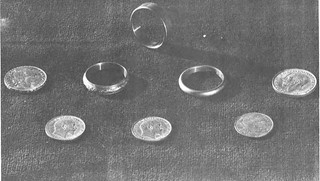 A researcher’s inquiry recently got me thinking about an interesting item I’d once found in a pile of unprocessed materials in the ANS Library. It was an auction catalog put out by a division of the U.S. Department of Defense to sell World War II escape & evasion kits, also called barter kits.
A researcher’s inquiry recently got me thinking about an interesting item I’d once found in a pile of unprocessed materials in the ANS Library. It was an auction catalog put out by a division of the U.S. Department of Defense to sell World War II escape & evasion kits, also called barter kits.
These kits, each containing a handful of gold objects, including coins, were, according to the catalog, issued to pilots and paratroopers to barter their way out of difficult situations if they were downed in unfriendly territory.
Reportedly, none were ever used for this purpose, so the kits were gathered and shipped off to the New York Assay Office, where they sat until 1979, when they were offered for sale in this auction.
Two kinds of kits were issued, one for the Atlantic region, containing gold rings, half- and one-pound gold sovereigns, and twenty- and ten-franc gold coins, and one for Southeast Asia, containing gold rings, a gold embossed pendant, a gold four-linked chain, and a 21-jewel Swiss calendar watch.
To read the complete article, see:
WORLD WAR II BARTER KITS
(http://numismatics.org/pocketchange/barter-kits/)
Other topics this week include the Royal Mint's classical design tributes and the Blue Cross medal. -Editor


